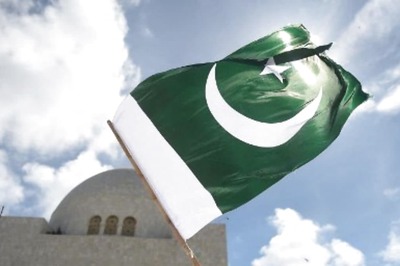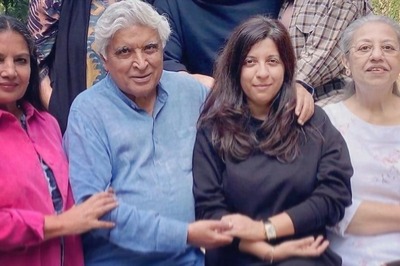
views
El Paso: President Donald Trump consoled victims of mass shootings in Ohio and Texas on Wednesday but faced protesters demanding gun control and denouncing what they say is his extremist rhetoric on race and immigration.
The president landed in El Paso, Texas, where a self-declared white supremacist murdered 22 people last weekend at a Walmart heavily frequented by customers of Hispanic origin.
Protesters gathered, just as they had at Trump's earlier stop in Dayton, Ohio, where nine people died in a separate mass shooting over the weekend.
Together with his wife Melania, Trump talked to patients and staff at Dayton's Miami Valley Hospital, telling shooting survivors, "you had God watching. I want you to know we're with you all the way," according to presidential spokeswoman Stephanie Grisham.
Ohio Democratic Senator Sherrod Brown, a Trump opponent, said afterwards that the president "was comforting and he did the right thing" in the hospital. But the senator denounced Trump's "racist talk and divisive talk" on immigration issues.
Outside the hospital, protesters held signs that called for restrictions on gun buying or, in one case, demanding impeachment proceedings.
A Trump baby blimp, an inflatable effigy of the Republican president in a nappy that has featured in protests in London and elsewhere, made an appearance.
"We don't want him here," El Paso resident Lynell Graham told CNN.
Pro-Trump protesters also took to the streets, illustrating the sense of division in the country ahead of next year's presidential election.
Trump social media director Dan Scavino tweeted that the president was "treated like a Rock Star inside the hospital."
Trump's stop in El Paso risked being more awkward still.
As a famed border city, El Paso is at the center of Trump's high-profile political campaign against illegal immigration.
The killer deliberately sought out the city, claiming to be stopping an "invasion" of illegal migrants, a term that has been used repeatedly by Trump as well.
Local Democratic congresswoman Veronica Escobar said she would not meet the president.
"From my perspective, he is not welcome here. He should not come here," Escobar said Tuesday on MSNBC.
Even the city's Republican mayor offered only a grudging welcome, stressing icily that he would greet Trump in his "official capacity." Trump, clearly had politics as much as tragedy on his mind ahead of next year's reelection bid.
Flying from Dayton to El Paso, he tweeted from Air Force One that he was watching a televised speech by the frontrunner in the race for the Democratic presidential nomination, Joe Biden.
In the speech, Biden accused Trump of fanning "the flames of white supremacy." "Watching Sleepy Joe Biden making a speech. Sooo Boring!" Trump commented.
Earlier Wednesday, before leaving the White House, Trump insisted that critics of his rhetoric were opponents "trying to make points." "I think my rhetoric brings people together," he said.
Trump is infuriated by accusations that his administration seeks to exploit racial divisions in the country to whip up his core voter base.
"I am the least racist person. Black, Hispanic and Asian Unemployment is the lowest (BEST) in the history of the United States!" he tweeted Tuesday.
But his campaign speeches and tweets repeatedly link Hispanic migrants to murder, rape and invasion. As recently as May, the president laughed and made a quip when a supporter at one of his rallies yelled that they should "shoot" illegal immigrants.
Trump has also railed crudely against a string of ethnic minority Democratic opponents in the last few weeks.
Where Trump and his mostly leftist opponents agree is on the unambiguous designation of the two events as terrorism.
Massacres by mostly lone gunmen are all but routine in the United States, where guns are easy to obtain legally and mass killings have taken on a sort of cult status in extreme circles.
Hardline defenders of gun ownership have long resisted portrayal of such tragedies as anything more than random, localized events.
But Trump on Monday said he had told the FBI to treat such crimes as "domestic terrorism." On Wednesday, Trump also said that Republicans and Democrats were "close" to agreeing on stronger background checks for people buying firearms -- a measure opposed by gun rights lobbies.
"I think background checks are important. I don't want to put guns into the hands of mentally unstable people or people with rage or hate," Trump said.
However, he said "there is no political appetite" for banning military style assault weapons, which are widely available and are often chosen by mass killers


















Comments
0 comment